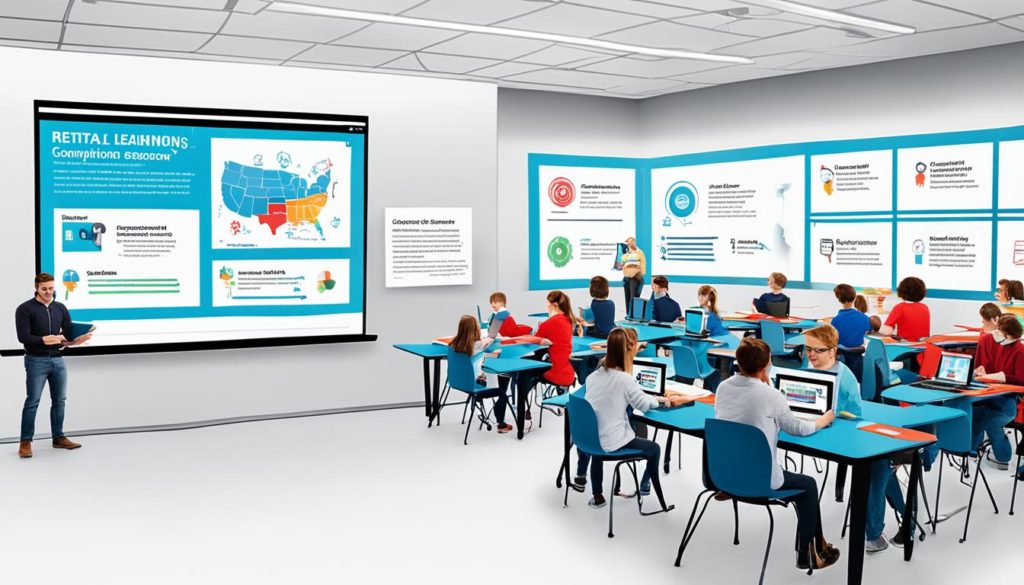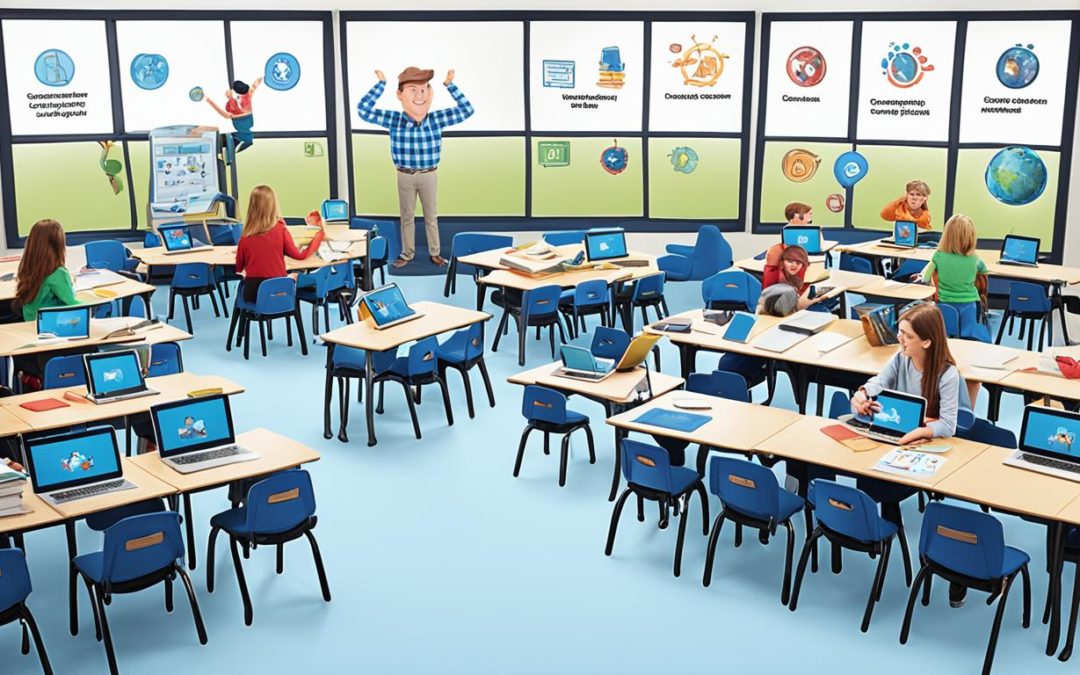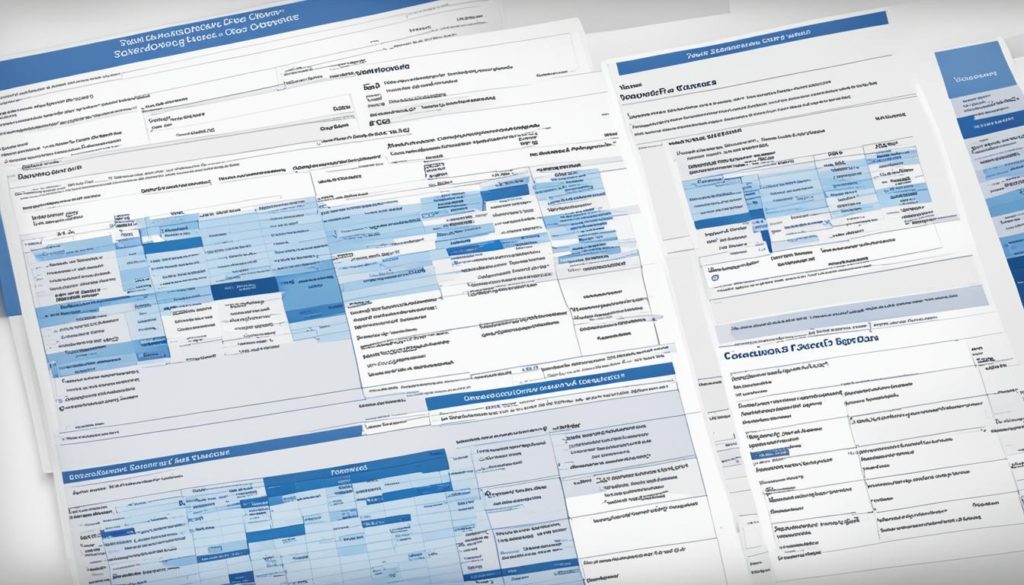Education is key for our personal and work growth. With tech advancements, face-to-face learning now competes with online methods. So, which is better? Which gives you a fuller learning chance? And what are their good and bad sides?
This article dives into in person learning vs online learning. We'll look at why traditional in-person education is great and the pluses of digital learning. After reading, you'll know what style fits you best.
Let's start this journey and find out the real deal between these learning methods.
Key Takeaways:
- Learn the ups and downs of in person learning vs online learning.
- See the good in face-to-face learning and online study.
- Understand which method goes with what you want and need.
- Look at the things to think about with both kinds of learning.
- Figure out which degrees you can get online and the prices.
Should I Go to College Online or On Campus?
Choosing between online and in-person learning requires weighing each option's benefits. In-person classes offer a lot, like face-to-face interactions. These include talking with your professors and working closely with classmates on projects. Such close-knit interactions make learning more lively and engaging.
Conversely, online classes bring their own strengths. Benefits and conveniences include flexibility in your study time. This lets you balance work or family obligations with education. Plus, everything is available remotely, offering a unique freedom for those with tight schedules.
To pick what suits you best, consider how you like to learn. Think about the importance of student engagement and if hands-on experiences matter to you. Additionally, weigh the advantages of managing your own study time and the flexibility online lessons provide.
Deciding Factors and Personal Considerations
Deciding between online and in-person college, think about your own situation and goals. Key aspects to keep in mind are:
- Your preferred learning style: Some excel in traditional settings, others value the freedom online classes offer.
- Staying organized and self-motivated is crucial for online success.
- How close you are to campus or if you have other commitments should influence your choice.
- Consider if your future career needs the hands-on experience traditional colleges provide.
Choosing the right path involves understanding your own needs. By weighing the benefits and disadvantages of each option, you can make an informed choice. This will guide you towards a learning experience that fits you best, setting you up for future success.
| Advantages of In-Person Learning | Benefits of Online Learning |
|---|---|
| Face-to-face interaction with professors and peers | Flexibility to learn at your own pace |
| Opportunity for collaborative projects and discussions | Access to course materials and discussions remotely |
| Hands-on learning experiences | Convenience for individuals with busy schedules |
| Immediate feedback from instructors | Ability to balance studies with work and family commitments |
What Are the Benefits of Online Education?
Online education is a great choice for many students. It includes an interactive virtual classroom. Here, students interact through live chats, discussions, and video calls. This lets them feel connected, even from far away.
Being online means you can learn from anywhere, anytime. You don't need to be in a specific place to study. This is perfect if you have a job or other commitments. You set your own pace, making it flexible for everyone.
Another plus is not having to travel to a campus. This saves time and money on transport. Learning remotely is handy for busy people or those in far-off places. It allows you to keep learning, from anywhere in the world.
Benefits of Online Education:
- Interactive virtual classroom for active participation and collaboration
- Flexibility in terms of location and scheduling
- Opportunity for remote learning without the need to commute
After examining these benefits, you can decide if online learning is right for you. Its interactive nature, flexibility, and remote study options cater to everyone's needs. It's a convenient way to learn that fits your lifestyle.
| Benefits of Online Education |
|---|
| Interactive virtual classroom |
| Flexibility |
| Remote learning |

What Are the Benefits of Taking Courses in Person?
Attending courses in person has many advantages. You get to directly interact with classmates and teachers. This helps create an environment where you make strong connections and participate actively.
In interactive classrooms, discussions happen in real-time. You get immediate feedback and experience learning by doing. All of this makes it easier to remember what you learn, especially when it needs hands-on practice. Talking to others and your instructors in face-to-face situations helps you think critically, get better at talking, and work well in teams.
Being there in the classroom also gives a sense of belonging and support. You can join study groups, make lasting friends, and get advice from teachers who’ve been there. This support is not easy to have in a virtual classroom.
Considering these points, in-person classes really add value to your learning. Now, let's see how these benefits stack up against online classes.
What Are Some Potential Considerations of Attending College Online?
Online college comes with many pluses. But, it’s also smart to know the possible hurdles. This way, you can decide wisely and get ready to tackle any challenges.
Challenges of Online Learning
One big challenge is needing good tech skills for online study. You have to know how to use tech for courses, discussions, and assignments. This means being familiar with computers and the internet is key.
Learning these tech skills will make your online class experience better. It helps you be fully involved in your classes.
Tech Skills for Online Classes
You need some special skills for online study. This includes knowing how to use systems like Moodle and tools for video calls. Let's look at a list of important tech skills:
- Proficiency in using learning management systems (LMS) such as Moodle, Canvas, or Blackboard to access course materials, submit assignments, and interact with instructors and classmates.
- Familiarity with video conferencing platforms like Zoom or Microsoft Teams for virtual lectures, discussions, and group projects.
- Ability to navigate online libraries, databases, and research tools to conduct independent research for your assignments and projects.
- Basic understanding of productivity tools like Microsoft Office or Google Suite for creating and collaborating on documents, spreadsheets, and presentations.
Learning these skills early will help you do well in your online courses and avoid problems.
Self-Paced Learning
Another thing to think about is that many online courses let you work at your own pace. Flexibility is great, but it means you need to be on top of your schedule. You have to finish work and meet deadlines without someone reminding you in person.
Working at your own pace matches your personal life better. But setting goals and staying organized are a must. These things are key to making sure you don’t fall behind.
Knowing what it takes to succeed online is important. These tips can help you decide if online college is right for you. They'll also prepare you for the journey ahead.

What Are Some Potential Considerations of Attending College On-Campus?
College on-campus is a big change that needs careful thought. It's about understanding what it takes and what you get back. Let's look at some big points.
Time Commitment of In-Person Classes
One big thing to think about is the time you spend in class. Unlike online courses, you have to be in a certain place at a certain time. You could spend a lot of time on campus in lectures and team activities.
Commute to Campus
Getting to campus can also take up a lot of time. This is especially true if you have to travel far. You need to think about how you'll get there, dealing with any traffic, and how it fits into your day.
Cost of Traditional Education
Money matters a lot. It's not just tuition; you need to consider things like where you’ll stay, how you get around, food, and books. All these costs can really pile up and vary by place and school.
Going to college in person comes with thinking about time, getting there, and how much it costs.
By carefully looking at all these points, you can see if going to college on-site is right for you. It's important to compare the good things, like meeting new people and using school services, with the tough parts and the costs.
Choosing between online and on-site college comes down to what you want and need. Think about how you learn best and what your future plans are. Looking at all these angles will guide you to the best choice for you. Be open to exploring your options and pick what supports your dreams.
| Considerations | On-Campus Learning | Online Learning |
|---|---|---|
| Time Commitment | Requires a fixed schedule and spending several hours on campus | Offers flexibility to learn at your own pace |
| Commute | Potential for time-consuming commute depending on location | No need to commute; study from anywhere |
| Cost | Includes tuition fees, housing, transportation, and other expenses | Lower tuition costs and reduced expenses for housing and commuting |
What Degrees Can You Get Online?
Online education has changed how we approach getting a higher education. It offers many degree programs in different fields. Reputable schools now let you earn your degree fully online. This is great for improving work skills, changing careers, or just learning more whenever you want.
Popular online degree programs include:
- Marketing: This program teaches you how to create great ads, understand market trends, and make strong branding.
- Nursing: Designed for healthcare, you learn medical basics and important skills for patient care.
- Engineering: Aspiring engineers study civil, mechanical, electrical engineering, and more online.
- Law: For those into justice, online law degrees cover important legal topics for various legal jobs.
- Computer Science: Highly sought after, this field offers knowledge in coding, software development, and security.
- Psychology: This program delves into the human mind, touching on cognitive and abnormal psychology.
Many more online degrees are available. You can find programs in business, education, healthcare, tech, arts, and more. If you're interested, there's likely a program for you.
When picking online degrees, make sure they're accredited. Accreditation means the program meets high standards and employers will recognize your degree.
Online degrees are a great option for many. They offer flexible learning, studying from home, and the chance to balance work and study. With the right online program, you can meet your educational goals easily.
Cost and Value of Online vs In-Person Learning
When comparing online and in-person learning, we need to think about their costs and benefits. Look at things like tuition, extra fees for on-campus activities, and what you might gain. This helps make a smart choice based on what you can spend and what you want from your education.
Online studies are usually cheaper than going to a physical campus. Classes online often cost less, which means many more people can afford to study. Plus, you save on things like living near the school and travel.
Still, the value of being in a physical class shouldn’t be overlooked. Being there in person gives you a classroom feel, lets you interact directly with others, and offers campus resources. It also means you get to grow your network in a more personal way.
But, online education does have its perks. You get to study when and where you want. However, it might be harder to connect with your teachers and classmates. You miss out on fast responses to questions, face-to-face chats, and group projects.
What matters most to you, the cost or the experience? If you care about saving money and having more freedom in your schedule, online learning might be your best bet. Yet, if you think learning is richer when you can physically be with others, you might prefer classes on campus.
| Factors | Online Learning | In-Person Learning |
|---|---|---|
| Tuition fees | Lower | Varies depending on the institution |
| Additional expenses | Reduced (housing, commuting) | Higher (housing, commuting, meal plans) |
| Access to campus resources | Limited | Extensive |
| Face-to-face interactions | Virtual | In-person |
| Networking opportunities | Varies (online networking platforms) | Extensive (campus events, clubs, etc.) |
By looking closely at what online and on-campus learning offer, you can pick what’s best for you. Think about your goals and what you can afford. This will guide you to the right path for your education.
Conclusion
After looking at in-person and online learning in detail, we see it varies for each person. It depends on what you like, your life, and what you want to learn. In-person learning is great for being in the classroom, talking with other students, and doing things together. It makes learning lively.
Online learning gives you freedom, being able to learn when it suits you, and from wherever you are. This suits those who are busy, working, or have to juggle many things. It's good for making your schedule.
When you think about what's good in each method, you will see which one fits you better. If you love being with other students, doing things together, and being fully in your studies, choose in-person. Yet, if you like to learn at your own speed, in a place you find comfortable, online might be just right for you.
Both ways of learning have their strong points. It's key to pick the one that meets your likes and helps you reach your goals. Think about what is really important to you, your situation, and aims. Then, you can start a learning path that's just for you.
FAQ
What is the difference between in-person learning and online learning?
In-person learning is when you go to school or college and meet teachers and students face-to-face. Online learning lets you study from home via the internet. You follow classes through a computer or a virtual classroom.
What are the advantages of in-person learning?
In-person learning lets you really connect with others. You work together in groups or talk in person. You get feedback quickly and can use all the resources right on campus.
What are the benefits of online education?
Online education is great for flexibility. You can learn at your own pace and fit studying around your life. Plus, you study in a virtual classroom with interactive lessons, saving time on commuting.
How does student engagement in person compare to online?
Being in class boosts how much you interact and learn with others. But, online, you can still talk with classmates and teachers. You engage through the internet, with less direct contact.
What are some potential considerations of attending college online?
To succeed online, you need to be good with tech and organized. Missing out on face-to-face time and practical learning might also affect your experience.
What are some potential considerations of attending college on-campus?
Being on campus means more time commitment and sticking to a schedule. This could be hard if you work or have family. It's also more expensive, with costs for living and meals.
What types of degrees can you get online?
Now, you can get many degrees online, from marketing and nursing to computer science and law. Online options in a variety of fields keep growing.
What is the cost and value of online learning compared to in-person learning?
Online learning is often cheaper because you don't need to live near campus. But, being in-person offers more like face-to-face time, resources, and network opportunities. It's about what matters more to you and what you can afford.
Which learning method is the best educational approach?
The best way to learn depends on what you want and need. In-person gives you a lively class and real-world learning. Online is all about working at your own time and place. Think about what each offers to make the best choice for you.









